

Atlas x IgniterSpace Online Innovation Program
Age Groups
--------------------------
Master Level :
8 - 11 years
Expert Level :
12 - 16 years
Course Timing
--------------------------
Each Level is 24 weeks
2 hours every week
from 11th December 2021
English Medium
Sundays
Master 4:30 pm to 6:30 pm
Expert 1:30 pm to 3:30 pm
Sinhala Medium
Saturdays
Master 1:30 pm to 3:30 pm
Expert 10:00 am to 12:00 pm
We provide all material and components required for the weekly activities, delivered to your Doorstep!
IgniterSpace guarantees an instructor for every group of 20 kids. All instructors are highly trained engineering professionals!
Lessons conducted interactively online via our e-Learning tool! Kid's work is monitored and individual assistance is given.
Our goal is to build a young generation that embraces innovation and entrepreneurship.
Atlas x IgniterSpace Online Innovation Program
The first step of an innovation journey is to build a passion for creativity and get exposed to different technological areas such as mechanical, electrical, electronic, computing. Once this foundation is built, we let students experiment around the concepts to gain deeper insights. That's where we teach them the process of innovation and entrepreneurship for them to work further on their own ideas.
IgniterSpace Innovation Program is specially designed to develop creativity of students. Students start with prototyping known machines to develop basic knowledge as well as fine motor skills. Then they move on to more explorative creations that are of production grade. Kids gain design thinking and entrepreneurship skills alongside with the ability to create production grade prototypes of their own concepts.
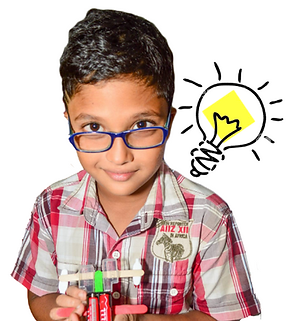
What kids do in each lesson :
They will make an invention by themselves in each lesson following the steps below. They will do all of this while learning many engineering concepts by themselves!
Step 1:
Read the Problem Story
The kids will read a comic to identify the problem for the day!
Step 2:
Look at the Innovation
Kids get introduced to the innovation been built on this day! They will see a live 3D model!
Step 3:
Designing
In this step the kids will do a design of the Invention that they will be making in the lesson
Step 4:
Building the Invention
The kids will use their tools & materials already provided to build the invention!
Step 5:
Presenting the Invention
Kids will explain the invention they have made to the clas
Some Sample Inventions :
Below you can see some of 100's of different fun inventions the kids will make during the 4 months Young Inventors course at IgniterSpace!

The starter kit contents :
When your child enrolls for this course, they will receive their very own starter kit to setup their own home makerspace. This kit contains all the tools, equipment & materials needed for the course. Each month they will receive the kits needed for that month.
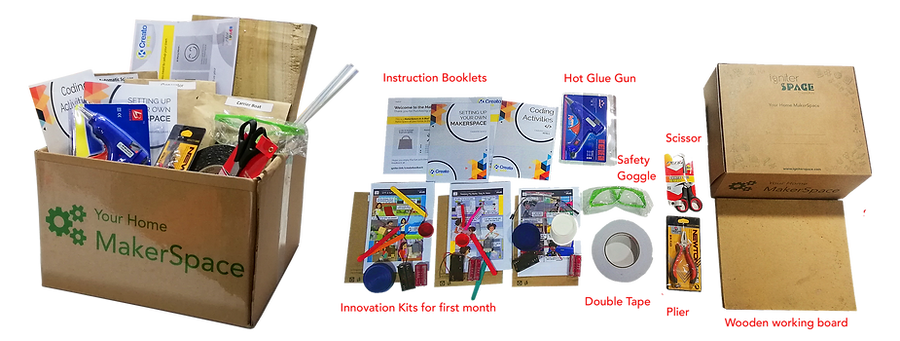
Atlas Creative Sheet
Each activity in this course will contain an "Atlas Creative Sheet" which is where an Arts & Craft element is added to each activity.
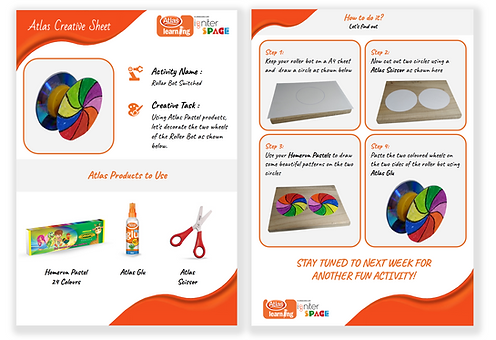
Skills Gained by Young Engineers
IgniterSpace Young Inventors program aims to build a passion for creativity in students as the first step of their innovation journey. The program exposes the students to a wide variety of technological and engineering concepts. At every class they will make a new creation with our instructors, learning concepts related to mechanical, electrical, electronic, robotics, computer programming, etc.
At the end of the 4 months program, students develop fine-motor-skills and overall knowledge around the following areas. Please note that the set of concepts and the theoretical depth vary depending on the age group of the student.
Mechanics
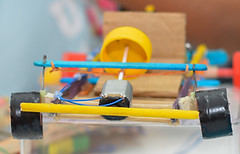
Fastening
Structures
Wheels and axles
Pulleys
Motors and gears
Forces and Motion
Balancing
Simple machines
Torque
Springs
Friction
Cams and cranks
Screw
Inertia
Counterweights
Electricals

Conductors and insulators
Fuses and switches
Basic circuit designing
Source and types of electricity
Safe use of electricity
Electrical circuits
Light and motion
Voltage and Current
Resistance
Electromagnetism
Electrical generators
Luminous Intensity
Electric charge
Electric Power
Power efficiency
Electronics
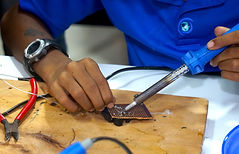
Resistors
Diodes
Transistors
Capacitors
Integrated Circuits
Soldering
Circuit Diagrams
Circuit Symbols
Wave-forms
Photoresistors
Photodiodes
Sensors
Robotics

Ethics
Autonomy
Sensing
Actuators
Mobility
Intelligence
Kinetics
Dynamics
Programming

Logical Thinking
Algorithmic problem solving
Abstractions
Control Logic
Variables
Parameters
Data structures
Code blocks
Game Programming
Animation Creation
Pitching

Demonstration Skills
Presentation Skills
Unique Value Propositions
Confidence
Selling a product
